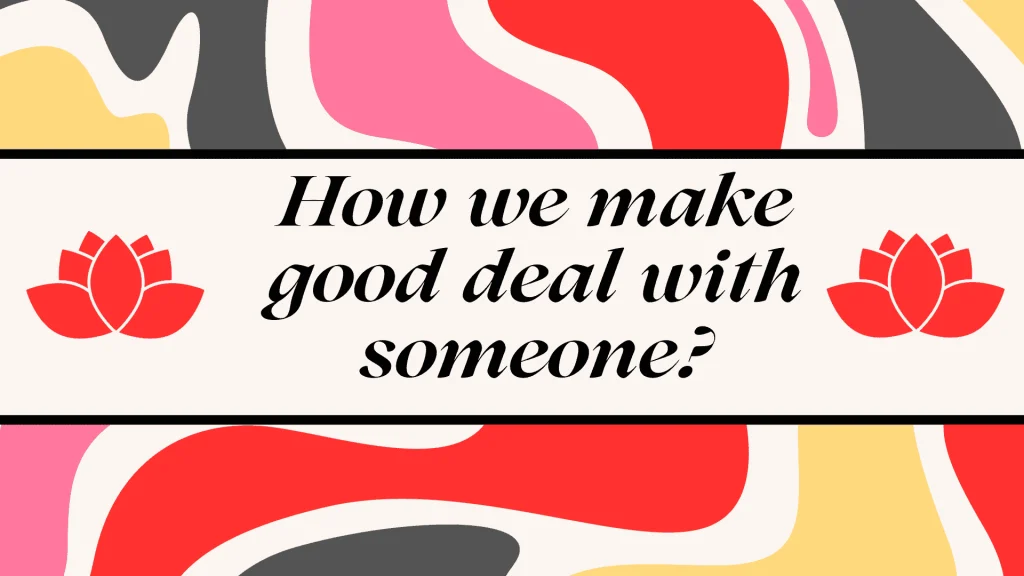
How we make good deal with someone?
Making a good deal with someone involves a combination of negotiation skills, preparation, and understanding of the situation. Here are some steps to help you make a successful deal:
Prepare Thoroughly:
Research: Understand the person or organization you’re dealing with, their needs, priorities, and any relevant market information.
Know Your Goals: Clarify your objectives and what you want to achieve from the deal. Be specific about your needs and limitations.
Build Rapport:
Establish a positive relationship with the other party. Good rapport can make negotiations smoother and more productive.
Listen Actively:
Pay close attention to what the other party is saying. Understand their perspective, needs, and concerns.
Communicate Clearly:
Express your own needs, expectations, and limits clearly and concisely. Avoid ambiguity.
Seek Win-Win Solutions:
Aim for outcomes where both parties benefit. This often involves compromise and creative problem-solving.
Be Patient:
Don’t rush the negotiation process. Sometimes, taking time to consider options can lead to better deals.
Be Flexible:
Be open to alternative solutions or concessions that may arise during the negotiation.
Understand Their Motivation:
Try to uncover the other party’s motivations and priorities. Knowing what drives them can help you make a more appealing offer.
Stay Calm and Respectful:
Keep emotions in check, even if the negotiation gets challenging. Being respectful and professional is crucial.
Use Negotiation Tactics:
Employ negotiation tactics like anchoring (starting with a high or low offer), mirroring (reflecting the other party’s words), and framing (presenting the situation in a particular light) as needed.
Document Agreements:
Once you reach an agreement, make sure to document it in writing. This prevents misunderstandings later on.
Consider the Long-Term Relationship:
Think about how the deal will affect your ongoing relationship with the other party. Sometimes, it’s worth making concessions for the sake of maintaining a good partnership.
Consult Experts:
If the deal is complex or involves legal, financial, or technical aspects, consider consulting experts in those areas for guidance.
Know When to Walk Away:
If the deal isn’t meeting your minimum requirements or if the other party is being unreasonable, it’s okay to walk away and explore other opportunities.
Learn from Every Deal:
After a deal is concluded, review what went well and what could have been improved. Use this knowledge to enhance your negotiating skills for future deals.
Remember that every deal is unique, and the approach may vary depending on the circumstances and the people involved. Effective negotiation is a valuable skill that can be developed and refined over time through practice and experience.
A young orphan guy complained to the Muhammad (peace be upon him) service.
An orphaned young guy arrived at the service to voice his displeasure over the Sarkar (peace be upon him) interfering with his pals. O Prophet of Allah, I was constructing a wall around my date garden when a palm tree belonging to a neighbour suddenly appeared in the centre of the wall.
I requested my neighbour to leave his palm tree for me so that I could straighten my wall, but he refused, so I offered to purchase it from him. However, my neighbour also declined to sell me a palm tree.
The young man’s neighbour received a call from the Sarkar of the Worlds (may peace be upon him).
When the neighbour arrived, the Prophet (peace be upon Him) informed him of the young man’s complaint and confirmed that it had indeed occurred. You told him, “peace be upon you.” You may either sell the young guy your palm tree and accept a fee, or you can leave it for him.
Both times, the man objected. The Prophet (may Allah have mercy on him and grant him peace) reiterated his position. the swaying palm In addition to receiving money when you sell to the young man, you will also obtain a gorgeous palm tree in paradise, whose shade will remain for a century. In return for a tree in this world, a tree in Paradise is offered. It excelled.
All the companions in the assembly were stunned to hear it.
Everyone was thinking that how a person who owns such a magnificent tree in Paradise will be deprived of Paradise and go to Hell. But alas, the worldly possessions.
The greed and greed of goods came to an end, and the man refused to sell his palm tree.
A companion in the assembly, Abul-Dahdah, who was present in the assembly, went forward and said to the Holy Prophet (peace be upon him) O Messenger of Allah (peace be upon you).
If I buy that tree and give it to this young man, will I get that tree of heaven?
The Prophet (Peace Be Upon Him) replied, “Yes, you will find that tree. “Abul-Dahdah turned to the man and asked him,”
Do you know my garden of dates?”
The man immediately replied, “Yes, why not?”
Who is the man in Madina who does not know the garden of six hundred dates of Abul-Dahdah?
A garden within which a building has been built. A well of sweet water in the garden and around the garden. From a distance, one can observe the construction of a stunning and unusual wall. The premium dates from your garden are being eagerly awaited by all of Madinah’s traders.
Abul-Dahdah said when the man’s speech was complete, then do you sell one of your palm tree in exchange for my entire garden.
He was unsure in his thoughts if he thought he would obtain the ownership of the 600 date as he gazed at the Sarkar of the two worlds (Peace Be Upon Him) garden of Abul-Dahdah in exchange for one date. The matter seemed to be beneficial in every respect. The Holy Prophet (peace be upon him) and the Companions in the Majlis testified and the matter was settled.
Abul-Dahdah happily saw the Holy Prophet (peace and blessings of Allah be upon him) and asked, “O Messenger of Allah, may Allah bless him and grant him peace, did one of my date trees ripen in Paradise?”
The Prophet (peace and blessings of Allah be upon him) said no.
Abul-Dahdah was surprised by the answer of the Prophet (peace and blessings of Allah be upon him). A tree in Paradise was to be given for a mere tree. You have given your whole garden. Allah, the Lord of Glory, is incomparable in His mercy. He has given you so many orchards of dates in Paradise in abundance, but the trees of which cannot be counted. which Loaded with fruits.
The Prophet (peace be upon him) kept repeating his words so much that everyone in the gathering began to wish that he was Abul-Dahdah. When Abul-Dahdah rose from there and returned to his house, he could not hide his happiness. He shouted to his wife from outside the house that I have sold this garden, palace and well along with the four walls. The wife knew her husband’s business skills and abilities very well. She asked her husband,
‘How much has sold all this for?’
Abul-Dahdah said to his wife,
“I have sold a tree here in heaven in exchange for a tree in the shade of which riders walked for a hundred years. “Abul-Dahdah’s wife shouted happily” You have made a profitable deal.
CONCLUSION:
This story illustrates the importance of generosity, selflessness, and the value of eternal rewards in the context of Islamic teachings. Here are several significant points from the tale:
The orphan’s complaint: A young man complained to the Prophet Muhammad (peace be upon him) about a dispute with his neighbor regarding a palm tree that was causing an issue with the construction of his garden wall.
The Prophet’s intervention: Prophet Muhammad (peace be upon him) mediated the dispute and advised the neighbor to either allow the young man to straighten his wall or sell the palm tree to him.
Offer of a tree in Paradise: The Prophet made an extraordinary offer to the neighbor. He said that if the neighbor sold the palm tree to the young man, he would receive a magnificent palm tree in Paradise, the shade of which would last for a hundred years.
Greed and worldly possessions: Despite the incredible offer of a tree in Paradise, the neighbor’s greed and attachment to worldly possessions led him to decline the offer.
Abul-Dahdah’s generosity: Abul-Dahdah, a companion of the Prophet, offered to buy the palm tree from the neighbor and give it to the young man in exchange for his entire garden.
Abul-Dahdah’s reward: When Abul-Dahdah asked the Prophet if one of his date trees had ripened in Paradise as a result of this transaction, the Prophet said no. However, the Prophet emphasized that Abul-Dahdah’s reward in Paradise would be far greater, with countless orchards and trees loaded with fruits.
Lessons learned: The story conveys the idea that selflessness, generosity, and faith in eternal rewards are more valuable than worldly possessions. Abul-Dahdah’s willingness to sacrifice his garden for the sake of helping the young man showcases the importance of selfless acts of kindness in Islam.
In the end, Abul-Dahdah’s actions were seen as a symbol of his faith and selflessness, and he was rewarded with the promise of abundant blessings in the Hereafter.
FAQ:
What does it’s a deal mean?
“It’s a deal” is an informal expression used to indicate agreement or acceptance of a proposed or discussed arrangement or agreement. Essentially, it means that the person is agreeing to whatever has been suggested or negotiated. It’s a way of confirming that a deal or agreement has been made and is typically used in a positive and enthusiastic manner to show willingness to proceed with the agreed-upon terms. For example:
Person A: “I’ll sell you my old guitar for $100.” Person B: “Sounds good to me!” Person A: “It’s a deal!”
In this context, “It’s a deal” signifies that Person B has accepted Person A’s offer to buy the guitar for $100, and they are confirming the agreement.
What is the synonym of deal?
There are several synonyms for the word “deal,” and the most appropriate synonym to use can depend on the context. Here are some synonyms for “deal”:
Trade
Transaction
Agreement
Bargain
Contract
Pact
Arrangement
Settlement
Negotiation
Compact
Please note that the suitability of these synonyms depends on the specific context in which you want to use the word “deal.” Each synonym may carry slightly different connotations or be more appropriate in certain situations.
What is deals in the Bible?
In the Bible, “deals” typically refers to agreements, transactions, or covenants made between individuals, groups, or nations. The term is often used in the context of promises or commitments, both between humans and between God and humanity. Here are a few key biblical concepts related to deals or covenants:
Covenant with God:
The Bible describes several important covenants or agreements between God and various individuals or groups. For example, the Abrahamic Covenant was a promise made by God to Abraham and his descendants that they would be blessed and become a great nation. The Mosaic Covenant was made between God and the Israelites through Moses, which included the Ten Commandments and other laws.
Marriage Covenant:
In the Bible, marriage is often depicted as a covenant between a man and a woman. The marriage covenant is a sacred commitment to love, honor, and remain faithful to one another.
Business and Financial Transactions:
While the Bible doesn’t delve into detailed economic practices, it does contain principles and guidelines for honesty, fairness, and integrity in business dealings. Proverbs, for example, contains wisdom regarding financial matters.
Spiritual Commitment:
The Bible encourages believers to make a personal commitment or “deal” with God through faith in Jesus Christ. This is often referred to as salvation, where individuals accept Jesus as their Lord and Savior, entering into a new spiritual covenant with God.
Oaths and Vows:
The Bible also discusses the importance of keeping one’s promises, especially when making oaths or vows to God or others. Breaking oaths or vows is discouraged, and honesty and integrity are emphasized.
It’s important to note that the specific language and terminology used in the Bible may vary depending on the translation and the context of the passage. The concept of deals or covenants in the Bible is significant, as it often reflects the idea of faithfulness, commitment, and the relationship between God and humanity.
What does deal mean in slang?
In slang, the word “deal” can have various meanings depending on the context. Here are a few common slang meanings of “deal”:
Agreement or Arrangement: In some contexts, “deal” can refer to an agreement or arrangement between people. For example, if someone says, “What’s the deal?” they are asking about the situation or agreement.
Quantity or Amount: When someone says, “That’s a big deal,” they are often referring to something significant or important. Conversely, if they say, “It’s not a big deal,” they are downplaying the importance of something.
Illegal Activity: In certain slang contexts, “deal” can be used to refer to illegal activities, particularly drug transactions. For example, “He’s involved in the drug deal” means he’s involved in illegal drug transactions.
Handling a Situation: Sometimes, “deal” is used to describe how someone is handling or coping with a situation. For instance, if someone says, “I can’t deal with this right now,” it means they can’t handle or manage the situation at that moment.
Skill or Ability: In some cases, “deal” can be used to describe someone’s skill or ability. For example, if someone says, “She knows how to deal with difficult customers,” it means she has the skills to handle challenging customer interactions.
Keep in mind that slang can vary by region and evolve over time, so the meaning of “deal” in slang may change or have additional nuances depending on where and when it’s used.
What is deal used for?
The term “deal” can have various meanings depending on the context in which it is used. Here are some common uses of the word “deal”:
Transaction or Agreement: A deal can refer to a transaction or agreement between two or more parties. This often involves the exchange of goods, services, money, or some other valuable consideration. For example, a business deal might involve the sale of a product or the signing of a contract.
Negotiation: A deal can also refer to the outcome of negotiations, where parties reach an agreement or compromise. In this context, it means finding a solution or settlement that both parties find acceptable.
A Special Offer: In marketing and sales, a deal can refer to a special offer or promotion. For instance, a store might advertise a “great deal” on a product, indicating that it is available at a discounted price or with added benefits for a limited time.
Handling or Coping: In informal language, “deal” can be used to describe how a person is handling or coping with a situation or problem. For example, someone might say, “I don’t know how to deal with this stress.”
A Batch or Collection: In some contexts, “deal” can refer to a batch or collection of items or cards. For example, in card games, you might receive a “hand” or a “deal” of cards.
Treatment or Management: In medical or healthcare contexts, “deal” can be used to describe the treatment or management of a condition or illness. For example, a doctor might discuss the best way to deal with a patient’s symptoms.
Distribution or Allocation: In certain situations, “deal” can refer to how something is distributed or allocated. For instance, the deal of playing cards to each player in a game.
The specific meaning of “deal” can vary widely based on the context, so it’s essential to consider the surrounding words and circumstances to determine its intended interpretation.
What does make a deal mean in English?
“In English, the phrase ‘make a deal’ means to negotiate or enter into an agreement with someone, typically in a business or transactional context. It implies that two or more parties have come to an understanding or arrangement regarding a particular matter, such as buying or selling goods or services, making a contract, or settling terms and conditions. Making a deal often involves discussions, compromises, and reaching a mutually acceptable agreement between the involved parties.”
What does make a deal mean in Urdu?
The word “deal” can be translated to Urdu as “معاونت” (maa’awinat) or “معاملہ” (maamla) depending on the context. Here are the meanings of these translations:
معاونت (maa’awinat): This can be used to refer to a transaction, cooperation, or assistance in a broader sense. It can also be related to a business deal or partnership.
معاملہ (maamla): This generally means a matter or issue. It can be used in the context of a deal or agreement as well.
The specific translation may depend on the context in which you want to use the word “deal” in Urdu.


Your point of view caught my eye and was very interesting. Thanks. I have a question for you. https://www.binance.com/id/register?ref=GJY4VW8W
Your point of view caught my eye and was very interesting. Thanks. I have a question for you.
you are in reality a just right webmaster The site loading velocity is incredible It seems that you are doing any unique trick In addition The contents are masterwork you have performed a wonderful task on this topic
Newtoki I truly appreciate your technique of writing a blog. I added it to my bookmark site list and will
Your article helped me a lot, is there any more related content? Thanks!
Your point of view caught my eye and was very interesting. Thanks. I have a question for you.
Your article helped me a lot, is there any more related content? Thanks!